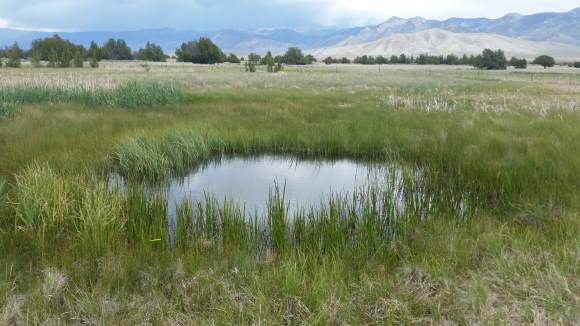
by Deep Green Resistance News Service | Jun 23, 2016 | Biodiversity & Habitat Destruction
By Will Falk / Deep Green Resistance
The Swamp Cedars in Spring Valley, Nevada have grown long memories. They stand on the valley floor under the bright Great Basin stars where the skies are still unspoiled by the encroaching glow of electricity. Beneath the trees’ branches, the blue petals of wild irises flutter in the breeze. All of them – the trees, the flowers, the stars – sway to the soft melodies played by the valley’s bubbling springs.
Most of the Swamp Cedars’ memories are pleasant. Carried by glaciers to the valley floor sometime in the last two and a half million years, the Swamp Cedars remember when wooly mammoths plodded through the Great Basin. The wind through their leaves whispers of a time when the Swamp Cedars trembled under the shadow of great teraton birds who rode the skies with their 25-foot wingspans. When wild horses stop at the springs to share a drink with the Swamp Cedars, the trees tell stories of the fleet native horses and camels that once ran the open spaces of North America.
Dawn in Spring Valley still carries the hint of curiosity the Swamp Cedars felt on that morning so many thousands of years ago when they watched the first humans walk from the foothills to rest in the welcome shade the trees offered. They learned to expect the humans regularly as they gathered under the trees for sacred ceremonies. They listened as the humans called themselves “Newe” and the trees learned that the word meant, “people.”
The Newe returned often to the Swamp Cedars for their ceremonies and the trees took delight with the Newe as old friends embraced after several seasons apart, as young people became lovers, and as information was shared about the year’s pinyon pine nut harvest.
A few of the memories are extremely painful. The Swamp Cedars recall when a different kind of human first arrived in Spring Valley. These humans were pale of skin and rode what the trees recognized as horses though they were a different species of horse than the native horses that had long since been lost. At first, there were just a few of the pale humans, but the trickle turned into a flood. The Swamp Cedars wince as they relive their first experience of steel – the excruciating pain that came when the first ax drove deep into living Swamp Cedar wood.
Worst of all, the Swamp Cedars witnessed the Newe screaming as the blue-clad humans on horses rode them down, the puffs of white smoke that turned into a haze, and the sharp cracks of rifle fire. The Swamp Cedars still recoil from the taste of blood in the soil when the bubbling springs turned red.
***
Dr. Ronald Lanner, one of the foremost experts on Great Basin trees explains the Swamp Cedars’ uniqueness: “…within the borders of Nevada, Rocky Mountain juniper is found in 39 mountain ranges but in only one valley – Spring Valley.” The Swamp Cedars carry an aura of magic. In fact, they are not cedars at all. They are actually Rocky Mountain junipers (juniperus scopulorum) and Rocky Mountain junipers always grow on dry, rocky mountain slopes or in somewhat shaded canyons. Always – except for the Swamp Cedars. Mysteriously, the Swamp Cedars grow in valley bottom woodlands that are flooded part of the year.
The Swamp Cedars of Spring Valley are likely on their way to evolving into a distinct species. Lanner describes, “…it is very likely the swamp cedars comprise a distinct ecotype of Rocky Mountain juniper. An ecotype is a genetically differentiated population that has evolved in adaptation to a distinctively different environment than characterizes that of the main population of its species.”
The Swamp Cedars are sacred to the Shoshone (Newe in their own language) peoples. According to Shoshone elder Delaine Spilsbury, Nevada’s Native peoples were hunter-gatherers who roamed the region in small familial groups while they searched for food. The Swamp Cedars were centrally located in the Shoshone’s traditional territories and offered ample shade during the hot Great Basin summers. Beneath the trees are a series of springs. Water from the springs encouraged plants and animals to proliferate. The Shoshone found many game birds and animals, medicinal plants, and fish in the nearby streams and ponds. Not far away from the Swamp Cedars, pinyon pine forests grew bounties of pine nuts. With these conditions, the Swamp Cedars became the favorite gathering place for the Shoshone and a sacred ceremonial site.
The Swamp Cedars are a massacre site. Three times over. Spilsbury explains that two of the massacres are of official military record while the last massacre happened at the hands of vigilantes with no military record.
The first two massacres happened in the 1860s. In the first massacre, most of the Shoshone escaped when American cavalry horses became mired in the mud created by the valley’s springs. The second massacre was much worse and Spilsbury says the written reports “state that men’s penises were cut off and shoved into their mouths and tree branches were shoved into women’s vaginas.”
The third massacre happened in 1897. This massacre is only remembered because two little girls hid in a ditch and were not discovered by the white vigilantes who murdered everyone else. The two little girls walked south to the Swallow Ranch. One of the two survivors was named Mamie by the Swallow family. Later, she married one of the Swallows’ hired hands – a Paiute man from Shivits, Utah named Joe Joseph. Spilsbury is the granddaughter of Mamie and Joe Joseph and, therefore, a direct descendant of a survivor of the last Swamp Cedar massacre.
The massacres cursed the Swamp Cedars with a bloody historical significance, but the massacres also endowed the trees with a deep, spiritual significance. According to Spilsbury, “Newe believe that because of their violent deaths, the spirits of the victims remain in the Sacred Trees.”
***
The Swamp Cedars are under attack. Close to 300 miles south of Spring Valley, the City of Las Vegas sprang up in the desert. Las Vegas’ population continues to grow in an arid landscape and the city is running out of water. Instead of restricting development, Sin City encourages residents and businesses to move to the city promising them access to the water they’ll need.

In 1991, the Southern Nevada Water Authority (SNWA) was created through a cooperative agreement among seven water and wastewater agencies in Southern Nevada including Big Bend Water District, City of Boulder City, City of Henderson, City of Las Vegas, City of North Las Vegas, Clark County Water Reclamation District, and the Las Vegas Valley Water District.
From the SNWA website: “SNWA officials are charged with managing the region’s water resources and providing for Las Vegas Valley residents’ and businesses’ present and future water needs.” To do this, SNWA has proposed a “Groundwater Development Project.”
The bulk of this plan hinges on a large pipeline from Las Vegas to rural eastern Nevada. The main pipeline is estimated to include 263 miles of buried water pipelines while an estimated 96 to 254 miles of collector pipelines will feed water to the main pipeline. The entire pipeline will pump 27 billion gallons of water from the desert annually. Between 71 and 88 wells will have to be dug in fragile ecosystems while somewhere between 96 and 254 miles of overhead distribution power lines will be built in a region famous for wildfires. The water will be taken primarily from 4 desert valleys – Spring, Cave, Dry Lake, and Delamar Valleys.
In other words, SNWA’s Groundwater Development Plan would destroy much of the Great Basin, would destroy Spring Valley and would destroy the Swamp Cedars.
According to Dr. David Charlet, in his study “Effects of Interbasin Water Transport on Ecosystems of Spring Valley, White Pine County, Nevada,” “Ecosystems of Spring Valley, like most valleys in Nevada, are stressed. Overgrazing, particularly during the late 1800s, water diversion, and groundwater pumping have weakened the plant communities.”
This means human activities are already undermining life in the area.
Charlet makes horrifying predictions for the Swamp Cedars, writing, “The groundwater development proposed by the SNWA for the Spring Valley will doom the populations of swamp cedars. It is unlikely that they will live long past the first 20 yr [sic] of drawdown…” In fact, Charlet believes the Swamp Cedars will act as the canaries in the coal mine as he describes what he thinks will happen, “The swamp cedars will be the first plant species in the valley to become locally extinct, and I imagine that they would not be able to hang on for more than 50 yr. The next species to follow the swamp cedars will be the greasewood, followed shortly by big Great Basin sagebrush, and finally by rabbitbrush.”
Dr. Lanner agrees with Dr. Charlet in Lanner’s study “The Effect of Groundwater Pumping Proposed by the Southern Nevada Water Authority on the ‘Swamp Cedar’ of Spring Valley, Nevada.” He writes, “Despite the fact that the swamp cedars are not currently considered at risk of extinction by state or federal authorities, they are vulnerable to groundwater pumping leading to lowering of the water table and loss of surface flooding. The granting of pumping permits would make it logical, however, for such listing to be initiated.”
Even more terrifying than Charlet’s 20-year prediction, Lanner gives the Swamp Cedars 2 years. He explains, “Since the swamp cedars’ root systems are concentrated in the upper one foot of soil, and almost entirely in the upper two feet, drawdown of water from this part of the soil profile can be expected to be devastating to the trees. I would expect trees to die within no more than two years following the pumping of water from their root zone, even if there is ample rainfall to keep surface roots alive.”
***
What will the world lose if SNWA has its way?
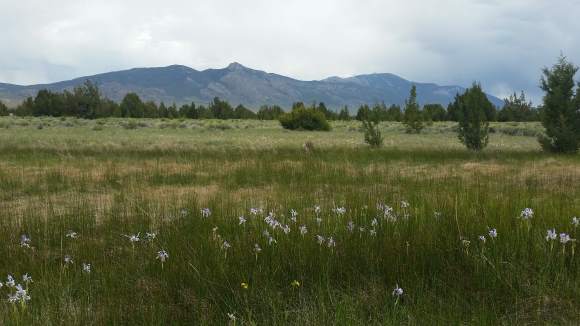
Wild irises and Swamp Cedars, Spring Valley
There are the obvious answers. The world will lose the Swamp Cedars, Spring Valley’s ability to support life, and a place of cultural significance for a historically oppressed people. Las Vegas will swell and, as it gets bigger, will require ever more water to support itself. Eventually, the city will reach farther and farther to steal water destroying community after community until it cannot find enough. Then, it will collapse. Many of those who have been forced to rely on the city’s infrastructure for the necessities of life will perish. These will be grievous wounds, of course. And they give us all the reason we need to know that SNWA must be stopped.
There are wounds that strike even deeper than these, though. They are wounds that scrape our spirits. They are aimed at our souls. They erase our collective memory and chill our courage to resist. Understanding the Swamp Cedars, listening to their stories, and sharing their memories helps us to regain our own memories. Regaining our memories will enable us to see more clearly.
What will we see when we see clearly?

We will see that this culture’s pattern of abuse is not inevitable. Las Vegas’ water shortage is the result of a complex of stories, institutions, and artifacts that both leads to and springs from the growth of cities. Cities are groups of people living in place in populations high enough to require the importation of the necessities of life like water. This is a way of life built on drawdown and can never be sustainable.
Contrast this to the hunter/gatherer culture practiced by the Shoshone – the people who will suffer the most from SNWA’s water grab. The Shoshone lived sustainably in places like Spring Valley for thousands of years without destroying the land. The dominant culture, on the other hand, has been in the area since the 1850s. And, already in this comparatively short time, the Great Basin is on the verge of collapse.
Central to Shoshone culture is the idea that the Swamp Cedars are sacred. As the Shoshone teach that the victims of the Swamp Cedars massacres remain in the trees, they ensure that the lessons of these massacres will never be forgotten so long as both the Shoshone and the Swamp Cedars survive.
It is in the Swamp Cedars’ sacredness that we find one of the prime motivations for the dominant culture’s destruction of the Swamp Cedars, for the destruction of indigenous peoples’ sacred places around the world, and ultimately for the annihilation of every last indigenous culture. In destroying the Swamp Cedars, in destroying sacred places, and in destroying indigenous cultures, the dominant culture destroys examples of true sustainability. The dominant culture wants to erase all memory that there are other, more beautiful ways to live.
For the vast majority of human history and in lands around the world, humans built cultures based on the notion that all living beings are sacred. Fish, birds, and animals were our kin. Mountains housed gods, rivers spoke the mysteries of existence, and spirits lived in the trees. When every living being is sacred, it is sacrilegious to destroy wantonly and the kind of total annihilation we face today is simply unthinkable.
When a small minority of human cultures banished the sacred to abstract sky gods or denied the possibility of the sacred in any form, they turned a living, speaking world into so much material to use. Surrounded, as this small minority was, by humans who still remembered the sacredness of all life, this small minority was incredibly insecure. To maintain the lies, they had to destroy the reminders. Natural community after natural community, species after species have fallen victim to this culture. The dominant culture operates as a serial killer. And, just like a serial killer, the dominant culture will destroy every last scrap of the evidence of its crimes if we let it.
The Swamp Cedars, by their sacredness to the Shoshone, by the memories they carry, by their very existence, betray the unspeakable evils committed by this culture. The dominant culture cannot afford for the Swamp Cedars to continue teaching the world about life. The Swamp Cedars must survive. We must stop the SNWA water grab and biocidal projects everywhere.
For more information about stopping the SNWA water grab, please see the Great Basin Water Network and Deep Green Resistance Southwest Coalition.
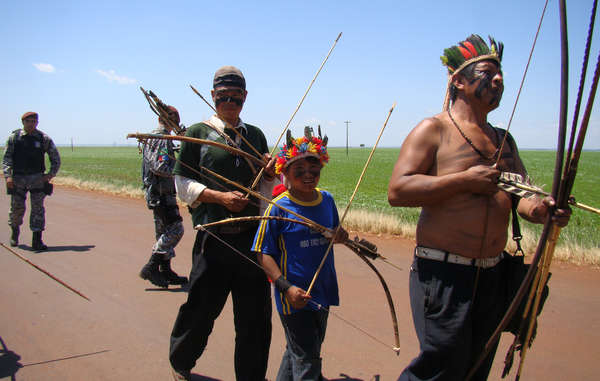
by Deep Green Resistance News Service | Jun 22, 2016 | Colonialism & Conquest
Featured image: The Guarani feel a deep sense of connection to their land and have protested against its theft and destruction
© CIMI/Survival
By Survival International
The Olympic torch is set to arrive on June 25 in a state where the Guarani tribe is widely feared to be facing annihilation due to systematic land theft, malnutrition, suicide and violence.
The torch’s arrival in Mato Grosso do Sul in the southwest of Brazil comes as part of a nationwide tour before the start of the Rio de Janeiro Olympics in August. It is set to be carried by Rocleiton Ribeiro Flores, an indigenous man from the Terena people, in the city of Dourados which is close to Guarani territory.
Last week, one Guarani man was killed and several others – including a twelve year old boy – were seriously injured in an attack by ranchers’ gunmen on Tey’i Jusu community.
The previous day, Survival received audio through its Tribal Voice project documenting a separate armed attack on Pyelito Kuê community. Elsewhere, another community, Apy Ka’y, is facing eviction after a land reoccupation in 2013.
With the eyes of the world on Brazil, many campaigners are hoping that the Olympics will raise global awareness of the genocidal violence, slavery and racism that have been inflicted on indigenous Brazilians past and present in the name of “progress” and “civilization.”
Over the past few decades, most of the Guarani’s land has been stolen by destructive agribusiness, and they have been forced to live on roadsides and in overcrowded reservations. Guarani children starve and many of their leaders have been assassinated. Hundreds of Guarani men, women and children have killed themselves and the Guarani Kaiowá group suffer the highest suicide rate in the world.
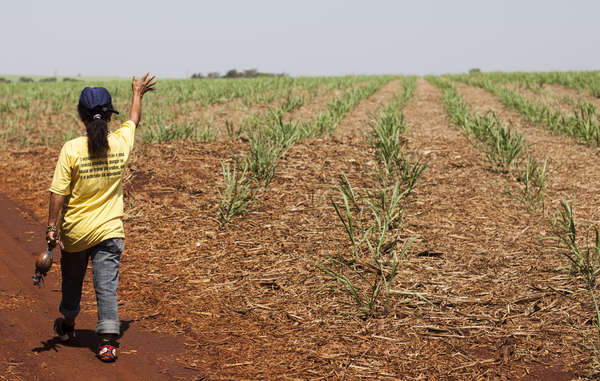
Damiana, a Guarani woman, performs a ceremony on her land. What used to be forest is now a vast farm.
© Paul Patrick Borhaug/Survival International
Tonico Benites Guarani, a spokesman for the tribe, recently visited Europe to urge international action on his people’s plight and told Survival: “A slow genocide is taking place. There is a war being waged against us. We are scared. They kill our leaders, hide their bodies, intimidate and threaten us… If nothing changes many more young people will kill themselves, and others will die of malnutrition. The impunity of the ranchers will continue and the Brazilian government will be able to continue killing us.”
The Guarani have made numerous attempts to reoccupy their lands, but have been harassed, intimidated and attacked by ranchers’ gunmen.
Under international and Brazilian law, the tribe has a right to their land. If the government returns it to them, they will have a chance to defend their lives, protect their lands and determine their own futures.
In April, Survival International launched its “Stop Brazil’s Genocide” campaign to draw attention to the threats facing the Guarani, the plight of Brazil’s uncontacted tribes – who are among the most vulnerable peoples on the planet – and PEC 215, a proposed change to Brazilian law which would undermine tribal land rights and lead to the break up and exploitation of existing indigenous territories.
As the Olympics approach, Survival supporters around the world are pushing Brazil to return the Guarani’s land and stop PEC 215, and to map out the territory of the uncontacted Kawahiva people to prevent their annihilation.
Survival’s Director Stephen Corry said: “This is undoubtedly the most serious and sustained attack on indigenous rights that Brazil has seen since the end of the military dictatorship, and it’s picking up pace. The media has focused on Brazil’s political turmoil in the run up to the Olympics, but very little has been said about the systematic annihilation of Brazilian indigenous peoples through the violation of their land rights. It was the genocide of Brazilian tribal peoples that prompted the foundation of Survival in 1969, and enormous progress has been made since. Now, almost half a century later, genocide is back on the table.”
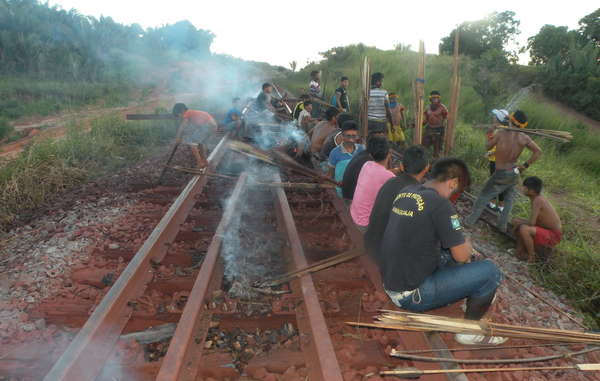
by Deep Green Resistance News Service | Jun 20, 2016 | Obstruction & Occupation
Featured image: The blockade. This is the first time the Awá have initiated a protest of this kind on their own. © Survival International
By Survival International
Members of Brazil’s Awá tribe have blockaded a railroad owned by Vale mining company in the eastern Amazon.
The company has moved to expand the railroad, but the Awá say the expansion will increase the number and size of trains which transport iron ore from the Carajás mine to the port of São Luis – and that this will make it harder for them to hunt for food.
Carajás is the world’s largest open pit iron ore mine. To transport the iron ore, trains that are over 3 kilometers in length regularly hurtle through close to Awá territory.
The tribe are calling for a meeting with the company and FUNAI, the Brazilian government’s indigenous affairs department, so that their wishes can be heard and their rights respected.
On Saturday a large group of Awá families occupied a section of the railroad which runs alongside their land.

At over 300 carriages in length, the Carajás train is among the longest in the world, and seriously disrupts the animals the Awá depend on for food
© Screenshot
Following a meeting with Vale representatives yesterday, the Awá agreed to suspend the blockade on condition that the company upholds its agreement to mitigate the impacts on the Indians’ forest.
This is the first time that the Awá have blockaded the railroad on their own initiative and reflects their determination to hold Vale to account.
In April 2014 Survival’s international campaign succeeded in pushing the Brazilian government to evict illegal loggers and settlers who had destroyed over 30% of their central territory.
However, the Awá are still one of the most vulnerable peoples on the planet. Around 100 remain uncontacted and are very vulnerable to diseases brought in by outsiders, to which they have no resistance.
Last year fires, possibly started by loggers, ravaged one Awá territory, home to the largest group of uncontacted members of the tribe.
Act now to help the Awá
Your support is vital if the Awá are to survive. There are many ways you can help.
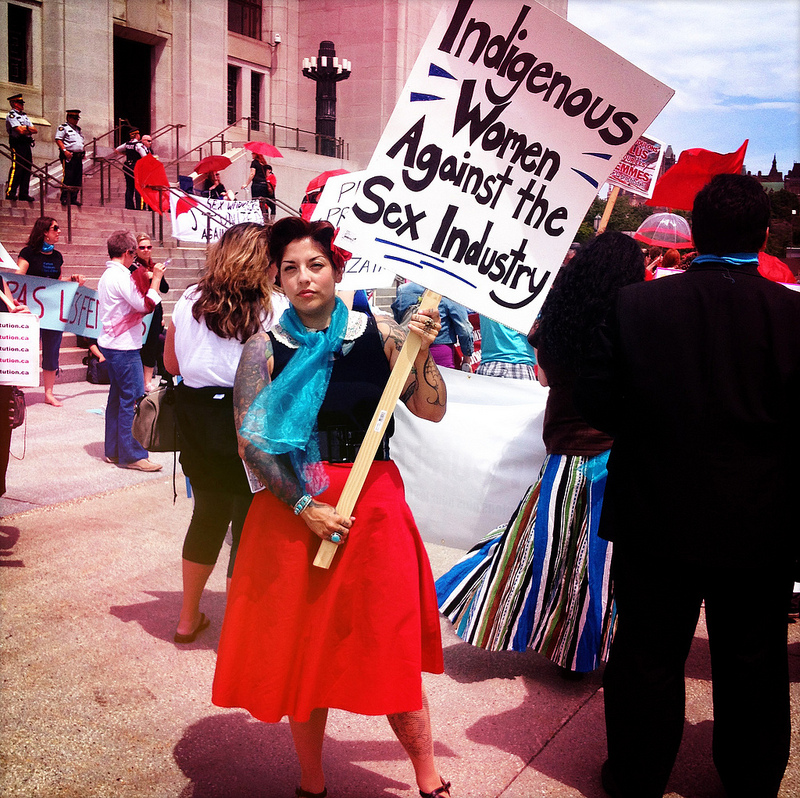
by Deep Green Resistance News Service | Jun 19, 2016 | Prostitution
By Cherry Smiley / Feminist Current
The full decriminalization of prostitution has received considerable mainstream media attention of late: On May 5, the New York Times published an article by Emily Bazelon called, “Should Prostitution be a Crime?” and on May 26, Amnesty International formally adopted a position in favour of the total decriminalization of prostitution.
Neither Bazelon’s article nor Amnesty International’s “sex work” policy take into meaningful account the ways in which prostitution functions as a system of colonialism that disproportionately targets Indigenous women and girls. Through these policies and positions, prostitution is sanitized and whitewashed into “sex work,” leaving Indigenous women and girls and our sisters of colour to deal with the consequences.
Today, as the result of the sustained work of Indigenous women and men, increasing numbers of individuals and organizations are beginning to recognize the importance of land to the survival, cultures, and well-being of Indigenous Peoples and the ways in which colonialism violently disrupts these relationships. Slowly, non-Indigenous people are beginning to understand the concept of “unceded territories” and acknowledge the exploitation of lands and “resources” that were forcibly removed from the care of Indigenous Peoples.
Male colonizers were thieves who took what wasn’t theirs because they believed they were entitled to it. But this entitlement didn’t stop at lands — these men decided they were also entitled to the bodies of Indigenous women and girls. According to research done by Melissa Farley, Jacqueline Lynne, and Ann Cotton, Indigenous women and girls in Canada were prostituted through early forts and military bases, and as “country wives” of white fur traders. Indigenous women and girls were targeted for prostitution in part because of lies told about them: they were “squaws” and “savages” who always wanted sex with white men. Prior to the invasion of North America, prostitution didn’t exist among the Indigenous Nations I have encountered — rather, prostitution was imposed on Indigenous women and girls by male colonizers. Entitlement to land continues today as non-Indigenous people live on and exploit Indigenous lands for profit, and entitlement to bodies continues in crisis levels of male violence against Indigenous women and girls.
In her article, Bazelon quotes Liesl Gerntholtz, Executive Director of the Women’s Rights Division at Human Rights Watch (HRW), another organization that has taken a position supporting the total decriminalization of prostitution:
“You’re often talking about women who have extremely limited choices. Would I like to live in a world where no one has to do sex work? Absolutely. But that’s not the case. So I want to live in a world where women do it largely voluntarily, in a way that is safe.”
Gerntholtz and HRW have apparently concluded that it is impossible to imagine a world without prostitution and, in doing so, disregard Indigenous histories and send the message to Indigenous women and girls that we are not worth fighting for. In taking this position, HRW reaffirms the racist myth that Indigenous women and girls (and women of colour) are disproportionately consenting to engage in prostitution because they so desire sex with white men. If we don’t recognize and fight back against the racist, sexist, and capitalist inequalities that funnel women and girls into prostitution and fight back against male entitlement, our only answer to the overrepresentation of Indigenous women and girls in the sex industry becomes: “Because they are ‘squaws’ who desire sex with strangers in disproportionate numbers to white women.” Is this the lie we want to continue to tell to Indigenous women and girls and the message we want to send to the men who buy and sell them?
Unfortunately, Bazelon and HRW can’t (or won’t) challenge male entitlement. Instead, women and girls are told they simply need to find better and “safer” ways to accommodate unchallenged male entitlement to our bodies.
The messages I received from the time I was a girl were meant to keep me “safer”: don’t talk to strangers, don’t walk alone at night, don’t wear short skirts. This messaging (always directed at girls and women) aims to constrain our movements and actions in the name of “safety.” Where is the messaging to boys and men not to rape? Where is the messenging that tells men and boys that they are not entitled to sex whenever, however, and with whoever they want? Where is the challenge to male entitlement to bodies and lands?
We see examples of male entitlement everywhere. The recent case of the Stanford rapist, Brock Turner, is a perfect example. His actions, as well as the light sentence, defence, minimization, and disbelief of Turner’s actions by his father and others, is an example of rape culture: a culture that allows, condones, and even celebrates the rape of women and girls by men. This culture affects all women and girls, but Indigenous women and women of colour in particular ways, leading one to question whether Turner would have even been charged or convicted had his victim been Indigenous or a woman of colour.
Watching these cases, Indigenous women and women of colour see that even a woman with white privilege received a horrific response to her sexual assault, leading us to ask, “If this happened to a woman with a relative level of privilege, what will happen to us?” Regardless of the race of the victim, what all women live through as victims of sexual assault and the ways our lives are constrained by male violence (or the threat of male violence) is a direct result of the patriarchal culture we live in.
Turner raped a woman because he felt entitled to her body. Male entitlement is a foundation of rape culture, yet many who claim to criticize rape culture simultaneously support the decriminalization of pimps and johns, thereby failing to recognize that the very same male entitlement that supports rape culture also fuels the sex industry.
Amnesty says their new policy, “does not argue that there is a human right to buy sex or a human right to financially benefit from the sale of sex by another person.” What the organization doesn’t seem to realize is that, without consequences for the actions of pimps and johns, their policy green-lights and condones those actions. Amnesty International’s policy naturalizes male entitlement to bodies (and lands) by refusing to acknowledge it as part of the foundation of patriarchy, racism, and capitalism and by refusing to challenge it accordingly.
To be clear, I am critiquing the system of prostitution, not the women and girls who are in prostitution. In the same way, I critique Canada’s horrific residential school system without criticizing residential school survivors and critique rape culture without blaming women and girls who have been raped. There is no shame in engaging in prostitution; Indigenous women and girls have been targeted for prostitution since the invasion of Canada by white men. The fact that Indigenous women and girls survive at all in a genocidal culture that hates us and hates all women is nothing short of a victory. But we deserve more than just survival — we deserve fulfilling, joyful lives that are free from male violence or the threat of male violence. We deserve to engage in sexual acts of our choosing, with partners that we choose, who consider our humanity and pleasure, without any form of threat or coercion, economic or otherwise. All those who sell sex should of course be decriminalized and all women and girls should have access to the things we need to build those fulfilling, joyful lives, like safe and affordable housing, nutritious food and clean water, access to education and employment opportunities, and a recognition of our rights to our lands, languages, and cultures. I don’t judge those who find themselves selling sex, but I do judge the men who choose to pay for or profit from the sexual exploitation of women and girls — the vast majority of whom are poor, Indigenous, and of colour. In Canada today, girls are sexualized from a very young age and women still only earn 72 per cent of what men earn for similar work; let’s not pretend girls begin their lives on equal footing.
I’ve witnessed a lot of online praise for Bazelon’s article and Amnesty International’s new policy, and sadly, I’m unsurprised at this show of support. When the status quo (male entitlement) isn’t being challenged, celebration is to be expected. I’m sure many johns and pimps applauded Bazelon’s article and Amnesty’s new sex work policy.
A number of well-meaning individuals and organizations refer to reports by HRW and Amnesty International regarding violence against Indigenous women and girls in Canada as important research in regard to this issue. However, due to these organizations’ position on prostitution, it is obvious to me that neither has an understanding of colonialism and the consequences of this ongoing process on the lives of Indigenous women and girls. Human Rights Watch, Amnesty International, and Bazelon fail to understand that, on a fundamental level, white male entitlement to bodies and lands is harmful and sometimes deadly, and that white male entitlement to bodies and lands must always be challenged. Prostitution is the colonization of bodies, and at its heart, is an expression of patriarchy, racism, and capitalism. This is about wealthy, white male domination and control.
I suggest that writers like Bazelon educate themselves further on colonialism and what it means before publishing further on these issues, and that HRW and Amnesty International refrain from commenting on any issue of male violence against Indigenous women and girls in Canada until they are willing to take a stand against male entitlement to women’s bodies and lands.
These positions and arguments are contradictory and cannot be reconciled to advocate for an end to violence against Indigenous women and girls on one hand, and for pimps and johns to buy and sell Indigenous women, without consequence, on the other. Indigenous women and girls don’t need “allies” that refuse to challenge colonialism in Canada and colonial ideologies within themselves.
Cherry Smiley is a feminist activist and artist from the Thompson and Navajo nations. She is a co-founder of Indigenous Women Against the Sex Industry and was the recipient of a 2013 Governor General’s Award in Commemoration of the Person’s Case and the 2014 winner of The Nora and Ted Sterling Prize in Support of Controversy. Follow her .
by Deep Green Resistance News Service | Jun 18, 2016 | Colonialism & Conquest
By Laura Hobson Herlihy / Cultural Survival
The Miskitu people (pop. 185,000) live in Muskitia, a rainforest region that stretches along the Central American Caribbean coast from Black River, Honduras to just south of Bluefields, Nicaragua. Two-thirds of Muskitia and the Miskitu people reside in Nicaragua. The Miskitu people in Nicaragua today are in a crisis situation. Armed mestizo colonists are attacking their communities, pillaging and confiscating their rainforest lands. This article is a cry for help.
The Miskitu people have legal ownership of their lands guaranteed by Nicaraguan Law 445, the ILO Convention 169, and the UN Declaration on the Rights of Indigenous People. Yet, mestizo colonists (called, colonos) from the interior and Pacific coast have invaded, and now illegally occupy, nearly half of their lands. In September 2015, violence over land conflicts erupted in the Miskitu territories of Wangki Twi-Tasba Raya and Li Aubra. These territories are located near the Coco or Wangki River, the international border between Nicaragua and Honduras.
Since September, mestizo colonists with automatic weapons have killed, injured, and kidnapped more than 80 Miskitu men with impunity. In fear for their lives, between 1-2,000 Miskitu refugees have fled to Waspam and Puerto Cabezas-Bilwi and Honduran border communities. The refugees–mainly women, children, and elders–are suffering from starvation and lack medical supplies. Children have not attended school for six months. Meanwhile, periodic attacks continue on Miskitu communities in Wangki Twi-Tasba Raya.
Much of the violence now occurring revolves around article 59 of the Communal Property Law (law 445). Article 59 requires the Nicaraguan state to complete saneamiento, the cleansing or the removal of colonists and industries from Indigenous and Afro-descendant territories. The current Nicaraguan government publically agreed to saneamiento but has not responded. Similarly, the government still has not provided protection to the Miskitu communities under attack or assistance to the refugees. As a result of the government’s delayed reaction to the crisis, the Miskitu people now suspect the Sandinista (FSLN) state to be complicit with the colonists’ invasion of their Indigenous territories.
In a separate but related issue, the FSLN government passed the Canal Law (Act 840) that approved the Chinese-backed (HKND) inter-oceanic canal to cut through the ancestral homeland of the Indigenous and Afro-descendant peoples along the Nicaraguan Caribbean coast. Tensions are rising over Indigenous territoriality and land rights, especially between the Miskitu people and President Daniel Ortega’s Sandinista government. The tense situation over land rights today bares eerie similarities to the war-torn years of the 1980s in Nicaragua, when Ortega first served as President (1985-1990) and the Miskitu fought as counter-revolutionary warriors in the Contra war within the Sandinista revolution (1979-1990).
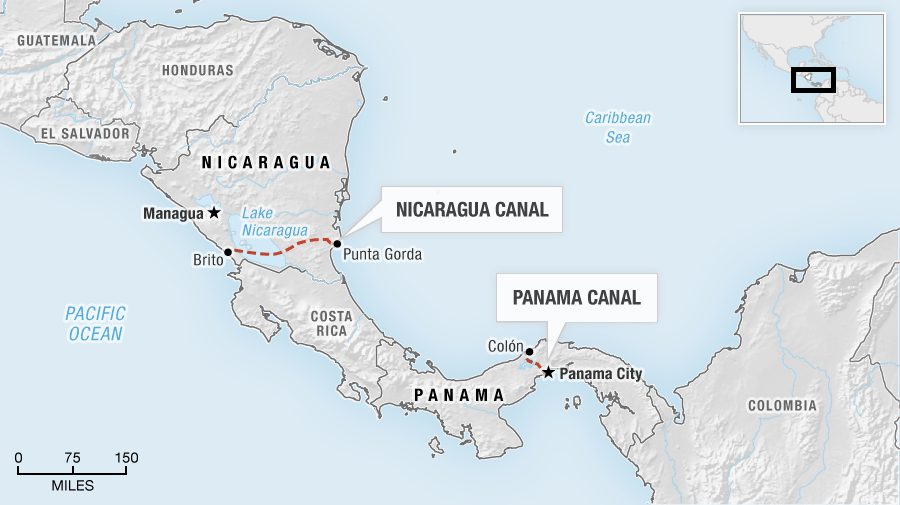
As a US anthropologist who has worked for over twenty years with the Honduran and Nicaraguan Miskitu people, I had the opportunity to attend the 2016 United Nations Permanent Forum on Indigenous Issues (May 9-20). On Thursday, May 12, I recorded Miskitu leader Brooklyn Rivera’s intervention in the session, “Dialogue with Indigenous Peoples.” Rivera has served as the Líder Máximo (literally, Highest Leader) of the Nicaraguan Miskitu people for over 30 years; after rising to power as a military leader in the revolution and war, Rivera in 1987 founded and became the long-term director of the Indigenous organization Yatama (Yapti Tasba Masraka Nanih Aslatakanka/Sons of Mother Earth). Special thanks to Costa Rican anthropologist Fernando Montero (ABD, Columbia) for transcribing Rivera’s United Nations intervention in Spanish and translating it to the English below.
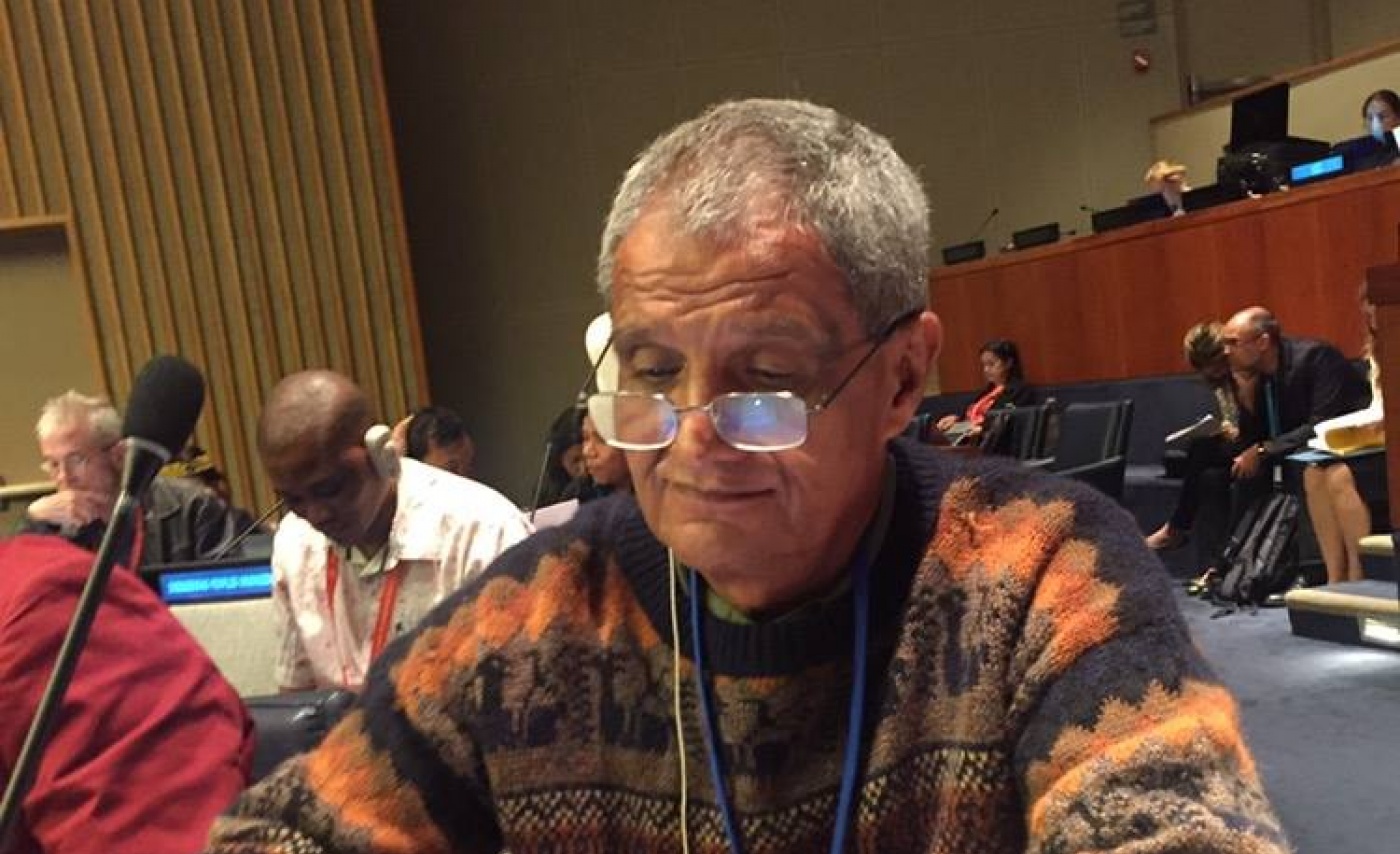
English Version
My name is Brooklyn Rivera. I am both a son and the highest leader of the Miskitu people of the Nicaraguan Muskitia. As we know, the rights of Indigenous peoples are essentially human rights. According to Article 1 of the UN Declaration on the Rights of Indigenous Peoples, Indigenous people have the right, both as peoples and as individuals, to the full enjoyment of their human rights and fundamental liberties. In my country of Nicaragua, the rights of Indigenous people have suffered severe setbacks in the last several years. Indeed, the current Sandinista government–contrary to its rhetoric in international forums and in flagrant violation of the rights of Indigenous peoples–freely acts against Indigenous peoples, advancing a consistent policy of aggression and internal colonialism.
Consider the following within the specific sphere of Indigenous peoples’ rights: the government imposes violence against our communities by means of settlers who invade ancestral territories, carrying out armed attacks, murders, kidnappings, rape, and displacement, producing refugees, most of whom are women, children, and people of old age. All this occurs in the face of governmental and institutional passivity, even complicity. Moreover, the Nicaraguan government is currently implementing a policy of militarization in our communities and fishing territories, committing murders such as that of our brother and leader Mario Lehman last September. In like manner, the government is overtly trampling on our communities’ right to ancestral autonomy by interfering with the election of their leaders according to their own practices and customs, devoting itself to destroying the structure and traditional procedures of our communities with the aim of replacing them with the so-called Sandinista Leadership Committees, part of their party structure. In this way they create and impose a spurious and noxious structure parallel to Indigenous authorities. You will understand that, by applying this policy, the government and the ruling party are fomenting division within families and communities, destroying their social fabric, cultural values and [imposing] heightened suffering and poverty. In addition, in open violation of the right to work, the Sandinista government denies jobs and government positions to Indigenous professionals and technicians, demanding that they become members of their party before considering them for these positions.
With regard to the sphere of the environment of our peoples in Nicaragua, I must first point out the dispossession of lands and territories suffered by Miskitu communities perpetrated by cattle ranchers, mining companies, and wealthy sectors linked to the government and the ruling party, who use settlers as spearheads. In this invasion, armed settlers arrive in our lands, advance the agricultural frontier, occupy extensions of territory, and destroy the habitats and ecosystems of Indigenous peoples, preying on their fauna, flora, and marine ecology. Needless to say, this extractivist policy involves the looting of ancestral communal resources such as forests, flora, mineral resources, water resources, and land itself with the illegal land sales in which settlers participate. I must also mention the promotion of megaprojects such as the interoceanic canal and the Tumarin hydroelectric dam in Awaltara, both of which violate Indigenous peoples’ right to prior, free, and informed consent. These megaprojects render entire communities vulnerable to disappearing along with their culture and language. This is the case of the Rama people, a small, vulnerable people in danger of extinction who reside in the Southern Moskitia. In the face of this crude reality and despite its demonstrated lack of political will and its disrespect for international laws and institutions—not to mention my own arbitrary, illegal expulsion from the National Parliament—once again we demand from the Nicaraguan government:
1. The immediate application of the recommendations issued last December by the UN Special Rapporteur on the Rights of Indigenous Peoples, in reference to the cleansing [“saneamiento”] of Indigenous territories and the protection of our communities in the face of settler invasion;
2. The immediate enactment of the precautionary measures suggested by the OAS’ Human Rights Commission on behalf of the Indigenous communities in the regions of Tasba Raya and Wangki Li Auhbra (location in the municipality of Waspam), approved in October 2015 and expanded in January 2016;
3. The immediate launch of a process of genuine dialogue and negotiation with Indigenous peoples via their organizations and leaders to reach real solutions based on respect for Indigenous peoples and the recognition of their dignity, as outlined in existing frameworks;
4. Finally, the immediate restitution of the undersigned as legislator, in accordance with his status as a popularly elected official put in power thanks to the votes of Indigenous peoples, whose constitutional and legal rights were violated with my arbitrary and illegal expulsion from Parliament.
I end my intervention by asking all participants, especially the Indigenous peoples in this forum, to engage in active solidarity with the Indigenous peoples of Nicaragua and their organizations as they resist and demand dignity, rights, and justice from the Sandinista government in Nicaragua.
Thank you, Mr. President.
En Espanol
Soy Brooklyn Rivera, hijo del pueblo mískitu de la Mosquitia nicaragüense y su dirigente principal. Como sabemos, los derechos de los pueblos indígenas son esencialmente derechos humanos. Como se establece en el artículo 1 de la Declaración de la ONU sobre los Pueblos Indígenas, los indígenas tienen derecho como pueblos o como individuos al disfrute pleno de todos sus derechos humanos y las libertades fundamentales. El país de donde vengo yo, Nicaragua, en los últimos años ha experimentado un grave retroceso en el ejercicio de los derechos de nuestros pueblos indígenas, recogido en el marco legal interno y externo del país. En efecto, el actual gobierno sandinista, contrario a su retórica en los foros internacionales y en abierta violación de los derechos de los pueblos indígenas reconocidos en la Constitución Política y en las demás leyes y los instrumentos internacionales suscritos, se dedica a actuar libremente en su contra impulsando toda una política de agresión y colonialismo interno.
Veamos: en el ámbito específico de los derechos humanos de nuestros pueblos indígenas, a través de los colonos invasores de los territorios ancestrales, impone una situación de violencia en contra de nuestras comunidades mediante ataques armados, cometiendo asesinatos, secuestros, violaciones y desplazamentos, produciendo refugiados, mayormente niños, mujeres y ancianos. Todo esto ocurre ante la pasividad y aun la complicidad del gobierno y sus instituciones. Más aún, el gobierno nicaragüense implementa una política de militarización de las comunidades y las áreas de pesca, en las que cometen asesinatos como en el caso del crimen del hermano dirigente Mario Lehman ocurrido en el mes de septiembre pasado. De la misma forma, el gobierno aplica un abierto atropello al derecho de autonomía ancestral de nuestras comunidades en la elección de sus autoridades basada en los usos y costumbres, cuando a través de sus turbas partidarias y con el acompañamiento de sus policías y hasta de militares, aún así sin el mínimo respeto a las leyes y formas organizativas propias, se empecina en destruir la estructura y los procedimientos tradicionales de nuestras comunidades con el fin de sustituirlos con los llamados Comités de Liderazgo Sandinista, una estructura de su partido en el poder, creando e imponiendo así una estructura espuria y nociva, paralela a las autoridades indígenas. Como comprenderán, aplicando esta política el gobierno y su partido crean división entre las familias y comunidades, destruyendo sus tejidos sociales, valores culturales y mayor sufrimiento y pobreza. Además, el gobierno sandinista en abierta discriminación al derecho al trabajo, niega a los profesionales y técnicos de los pueblos indígenas el derecho al trabajo cuando exige que debe convertir a ser miembro de su partido para ocupar cargos o empleo en el país.
En relación al ámbito del medio ambiente de nuestros pueblos en Nicaragua, debo iniciar señalando el despojo de las tierras y territorios que sufren las comunidades en la Mosquitia de parte de los terratenientes ganaderos, empresas mineras y grupos adinerados vinculados al gobierno y a su partido, utilizando a los colonos como punta de lanza. En la invasión, los colonos armados llegan a nuestras tierras, aplican un avance agropecuario, ocupan extensiones de territorio y destruyen los hábitats y los ecosistemas de los pueblos indígenas, cometiendo depredaciones ambientales en su fauna, flora y entorno marino. Lógicamente, con esta política extractivista pasa por el saqueo de los bienes comunales ancestrales tales como los bosques, la flora, los recursos mineros, los recursos hídricos y la misma tierra con el tráfico ilegal de parte de los colonos. También aquí debo mencionar el impulso de los megaproyectos tales como el canal interocéanico y el hidroeléctrico Tumarín en Awaltara, en ambos casos violentando el derecho al consentimiento previo, libre e informado de los pueblos, impulsan sus megaproyectos en los que exponen la desaparición de comunidades enteras junto con su cultura y su idioma. Tal es el caso del pueblo Rama, pueblo pequeño, vulnerable y en proceso de extinción, ubicado en la Mosquitia Sur. Ante esta cruda realidad y a pesar de su falta de voluntad política demostrada y de su irrespeto a las leyes y las instituciones internacionales, así como de mi expulsión arbitrario e ilegal del Parlamento Nacional, como un esfuerzo de solución al conflicto impuesto, una vez más exigimos al gobierno nicaragüense:
- La inmediata aplicación de las recomendaciones de la Relatora Especial de las Naciones Unidas sobre los Derechos de los Pueblos Indígenas, emitidas en el mes de diciembre pasado, referentes al cumplimiento de la etapa de saneamiento de los territorios y de la protección de nuestras comunidades ante la invasión de los colonos;
- El inmediato cumplimiento de las medidas cautelares presentadas de parte de la Comisión de Derechos Humanos de la OEA a favor de las comunidades indígenas de la zona de Tasba Raya y de Wangki Li Auhbra en el municipio de Waspam, y abrobadas en el mes de octubre 2015 y ampliadas en enero de 2016;
- La inmediata apertura de un proceso genuino de diálogo y negociaciones con los pueblos indígenas a través de sus organizaciones y líderes que conduzcan a unas soluciones reales basadas en el respeto y el reconocimiento de la dignidad y los derechos de nuestros pueblos reconocidos en las normativas;
- Finalmente, la restitución inmediata del suscrito como legislador electo popularmente con los votos de sus pueblos indígenas, violentando mis derechos constitucionales y legales con el despojo arbitrario e ilegal cometido durante mi expulsión del Parlamento.
Termino mi intervención requiriendo a todas y todos los participantes, mayormente a los pueblos indígenas de este foro, una solidaridad activa con los pueblos indígenas y sus organizaciones en Nicaragua en el marco de su resistencia y demanda de dignidad, derecho y justicia ante el gobierno sandinista en Nicaragua.
Gracias, Presidente.











